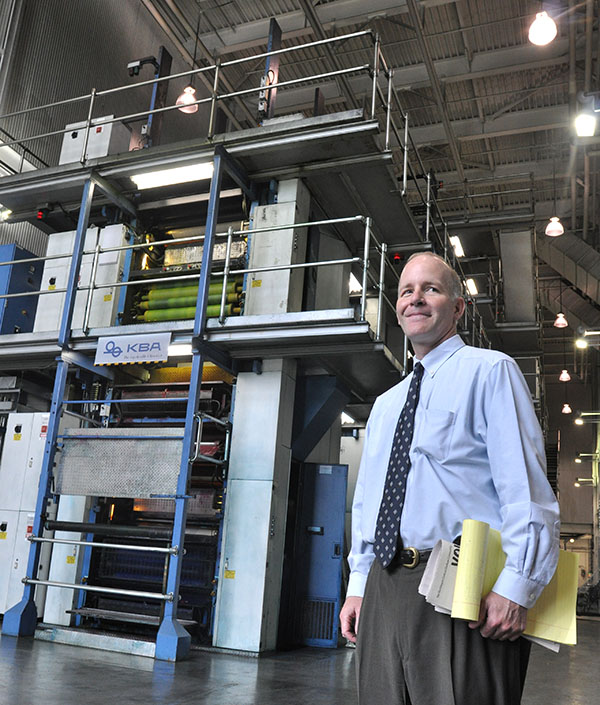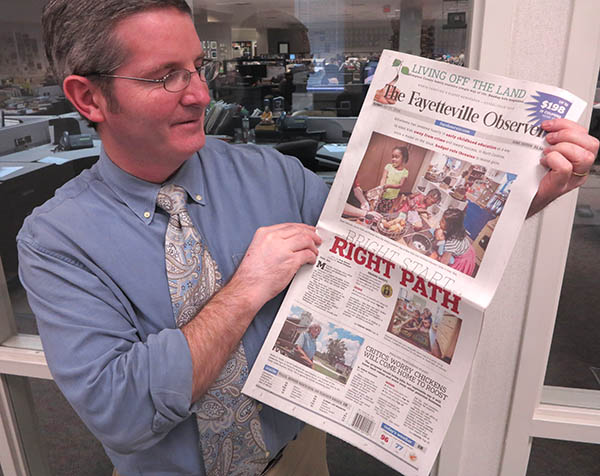In the 14th year of the Community Journalism Roadshow, our latter-day Johnny Appleseed again wanders the “blue highways” of North Carolina — this summer from Lake Lure in the west to Ocracoke in the east — leading free, on-site workshops aimed at helping community newspapers do what they do best: tell the never-ending “relentlessly local” of Our Town. Today’s visit is to the Fayetteville Observer.
“You know there’s no good news in that thing.”
The passerby, a middle-aged woman and a total stranger,” grinned impishly as she walked past, pointing down at the copy of the Fayetteville Observer I was reading in the breakfast room of the Hampton Inn.

I opened my mouth to speak, but nothing came out. The drive-by zinger had flummoxed this old newspaper geek, rendering me speechless. Where was the lighting-fast clever response to put her in her place?
Ah, there it is…but too late! A Charles Kuralt classic at that (and I paraphrase here):
“The only thing worse that hearing about all those awful things happening… is NOT BEING ALLOWED to hear about all those awful things happening.”
Having recently returned from China where much of the news is managed massaged, tweaked and redacted, I can be forgiven for being a little sensitive about this subject. Whatever the faults of our media, at least we still have a free press.
THE TRUTH BE TOLD
As irony would have it, I was there in Fayetteville to lead a workshop on community journalism with a distinguished cohort of reporters, columnists and editors from what is arguably the best daily newspaper in North Carolina. (How I wish I could have dragged along that detractor from the motel!)

Founded in 1816, the Fayetteville Observer is the oldest continuously publishing newspaper in the state. It is also the largest independently owned daily in N.C., led by the indefatigable Charles Broadwell, the Observer’s fourth-generation publisher. The paper has won the General Excellence award from the NCPA three out of the last four years. Not too shabby.
Wait, there’s more. Housed in a spacious new (’99) single-story building, the F/O boasts the state’s best press, a six-story KBA German press that is a marvel of ink-on-paper technology, allowing the Observer to print full color on up to 48 pages.
Such precision printing has earned the F/O the printing business of the like of the Indy Week of Durham, the Wilmington Star-News and a host of smaller publications that keep the pressroom hopping.
FAYETTE-NAM?
That the state’s best daily is located in Fayetteville seems to surprise folks, many of whom may be thinking of that city in the past tense. Yes, it will always be a host city to Fort Bragg and Pope Air Force Base, with its large, young, transient military population — but the town is light years ago way from the seamy steamy “Fayette-Nam” of the ‘70’s.
So as to get a feel for the new Fayetteville, I drove down a day in advance, and that evening wandered downtown in search of a cool place for dinner. What I found pleasantly surprised me. An ambitious downtown revitalization project had transformed the main street: charming up-scale European-style outdoor cafés under over-arching trees and old-fashioned light posts.

THEY GET COMMUNITY JOURNALISM
So how can a roughly 60k-circulation daily that serves 10 counties actually DO community journalism? And the answer is: the Fayetteville Observe, which began as a humble weekly 198 years ago, attempts to keep that “weekly mindset.”
Explains Publisher Broadwell: “We’re just a weekly that comes out seven days a week.”
But the paper has the robust muscle of a community daily – and when they want to flex those journalistic muscles, the result can be transformational for the community.
That’s the case with the year-long project, “Seeking Safety” that attempts to understand and help solve crime in Fayetteville. I’m so impressed with this effort that I’m taking the liberty of re-posting Exec Editor Mike Adams’ introductory column from last November in its entirety.
At our workshop, Mike told me that tangible results have already grown out of the series, as city leaders from all walks of life have been drawn together by the series in sort of a community-wide think tank. There’s already been progress, he said, because the Observer chose to step off the sidelines and become an active participant in helping to grapple with the chanllenge. To my way of thinking, THIS is what true community journalism and community-building is all about.
ABOUT THE SERIES: “SEEKING SAFETY”
By Michael Adams, executive editor
For too long, living with crime and the fear that accompanies it has been the norm in Fayetteville.
Perhaps for most of us, the fear is little more than a nagging concern, enough to prompt us to install an alarm system, avoid certain parts of the city at certain times, even buy a gun for protection. For too many, though, it is a deeper worry that keeps us trapped in our homes, afraid and angry about what has happened to our community.
There was a time, maybe in our memory, maybe only in the stories told by our parents, when such fear barely existed. A time when we left our doors unlocked, when we didn’t worry about where our children were playing, when our schools didn’t need metal detectors.
But in the years since then, we have adjusted to the crime. We’ve accepted 4,000 break-ins, 8,000 thefts, 1,000 robberies and assaults a year as an unpleasant part of life in Fayetteville. We’ve shrugged and, with a survivor’s wry pride, called our home “Fayettenam.”
But it is increasingly clear that we are tired of adjusting. From the Police Department, from City Hall, from election campaigns and from community forums, we’ve heard a consistent message: We’re fed up with crime. We want answers.
Today, The Fayetteville Observer joins the search for solutions. We are calling our effort “Seeking Safety.” That’s what people really want, to feel safe in their own community.
Over the years, our staff has become adept at a particular type of reporting: We can dig into issues, expose problems, explain why things are broken.
We are, as our newspaper masthead suggests, an observer. It is a role we are proud of and which we will continue to play.
But this crime problem demands a new approach. We have to be willing to get off the sidelines, to do more than just report all the things that are wrong, that are creating Fayetteville’s climate of fear.
So we are going to spend the next year looking at crime from a new angle. We will examine programs and efforts here and across the country, looking for strategies that are working. Our focus will be on finding real-world solutions that are applicable to Fayetteville. We will seek ideas from experts and from people who know what it is like to live in crime-ridden communities.
Our reporting will ask tough questions and challenge leaders when they talk about obstacles rather than opportunities.
One of the reasons I’ve spent 26 years – all of my adult working life – in newsrooms is that I believe newspapers can make a difference. Specifically, I believe our newspaper can make a difference in this community.
We are going to put that belief to the test over the next year. Because on this story, we are aiming to create momentum and action. We want to help drag that burden of fear off Fayetteville.
Greg Barnes, who has won numerous awards as a writer and an editor, will lead our reporting effort. He already has spent weeks talking to city leaders, police, school officials, mentors and crime victims, listening to their stories and ideas.
Today’s story, laying out the problem and the need for the community to come together to work on it, launches our project. Next month, he will have the first installment in our search for meaningful solutions.
Police reporter Nancy McCleary also will be a regular contributor to the project. Beginning in late November and every two weeks after that, she will be sharing tips on personal safety and ideas about how residents across the community can get involved in crime-prevention efforts.
We’re doing all of this in a partnership with WRAL-TV. That partnership will combine the best of both of our news organizations to share the search for solutions with a larger audience than either of us could do separately.

